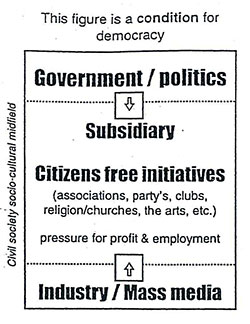Conclusions of the subjects 1993
Theme 1993: The arts & the social midfield
The role of the arts in a Europe on the way to integration.
A debate on social and cultural issues with political implications.
Third Symposium August 8-13 1993, at 'De Bron', Holland.
MAIN CONCLUSIONS
The arts are a key to enrichment of life, and understanding of the past and the present, and the information of vision for the future. As such they affect every dimension of our lives.
1. Arts
Arts: this statement is aimed specially at establishing artistic activity as an essential factor in social experience, and as contributory factor in reflecting, critiquing, confirming and enlarging a community's value system - its sense of meaning, purpose and identity.
2. The family1
The family is the foundation of society and the breeding ground for understanding and the meaning of life; the place where norms, values and identity are passed on to the next generation. It is the starting point for participation in social, cultural and religious life.

3. Politics2
Politics: we strongly support the principle of subsidiarity as a protection for artistic and religious expression in the community. We maintain that citizens and organizations must have the right and facilities to call all levels of authority to account at law for this principle.
4. The mass-media3
The mass-media should be the servant of the community. We are deeply concerned with the directing motives behind the mass-media. In our view the mass-media should be aimed at fostering the best of a community's conscience and cultural expressions. We suggest that governments set up a new mechanism to create stronger connections between the mass-media and the social midfield.
5. Religion
Without faith and vision the people wil perish: Religion is the root for our world view, identity, norms, values4 pluriformity.
6. Education
Education should not be dictated by demands only of industry and science. Subjects which deal with norms and values (e.g. religion & culture, justice, democracy, pluriformity), should be given comparable status in the educational curriculum. We see the arts as such a subject.
7. The social-midfield5
The social-midfield should be reinforced to be the true open market place of citizens and groups for a genuine exchange in diversity and pluriformity, nurturing ground for democracy. It is vitally important that citizens should organize themselves in trade unions, in clubs, as churches and in associations to exercise their influence effectively.
8. Proper social conditions
Proper social conditions should be guaranteed by governments for artists in their need for survival and maintenance of skills. Support is always needed for the porfessionals and amateurs to secure diversity and pluriformity in their work from national right down to a local level.
9. Freedom
It is vital that freedom of movement should be secured for artists and artworks between all countries within the EC, and wherever possible, outside it. Every form of exchange-programme should be stimulated: for students, schools, artists, festivals, museums, villages, etc., by the EC and national governments within it.
10. Sub-cultures
Sub-cultures (minority cultures) should be given every possible opportunity to develop their own particular unique cultural expression (language for instance).
2 Subsidiarity: the principle that initiatives and decisions should be made at the lowest levels. What people can do at more local levels, is not the responsibility of the government.
3 Concerns are: violence, horror, occult, the power of advertisement, the power of lobbies, pornography.
4 Here is meant the complex of basic beliefs which are felt to be beyond question, and which direct the moral sense of individuals and communities. In this sense everybody is religious, but in the great religions' such beliefs are related to what are believed to be transcendent realities.